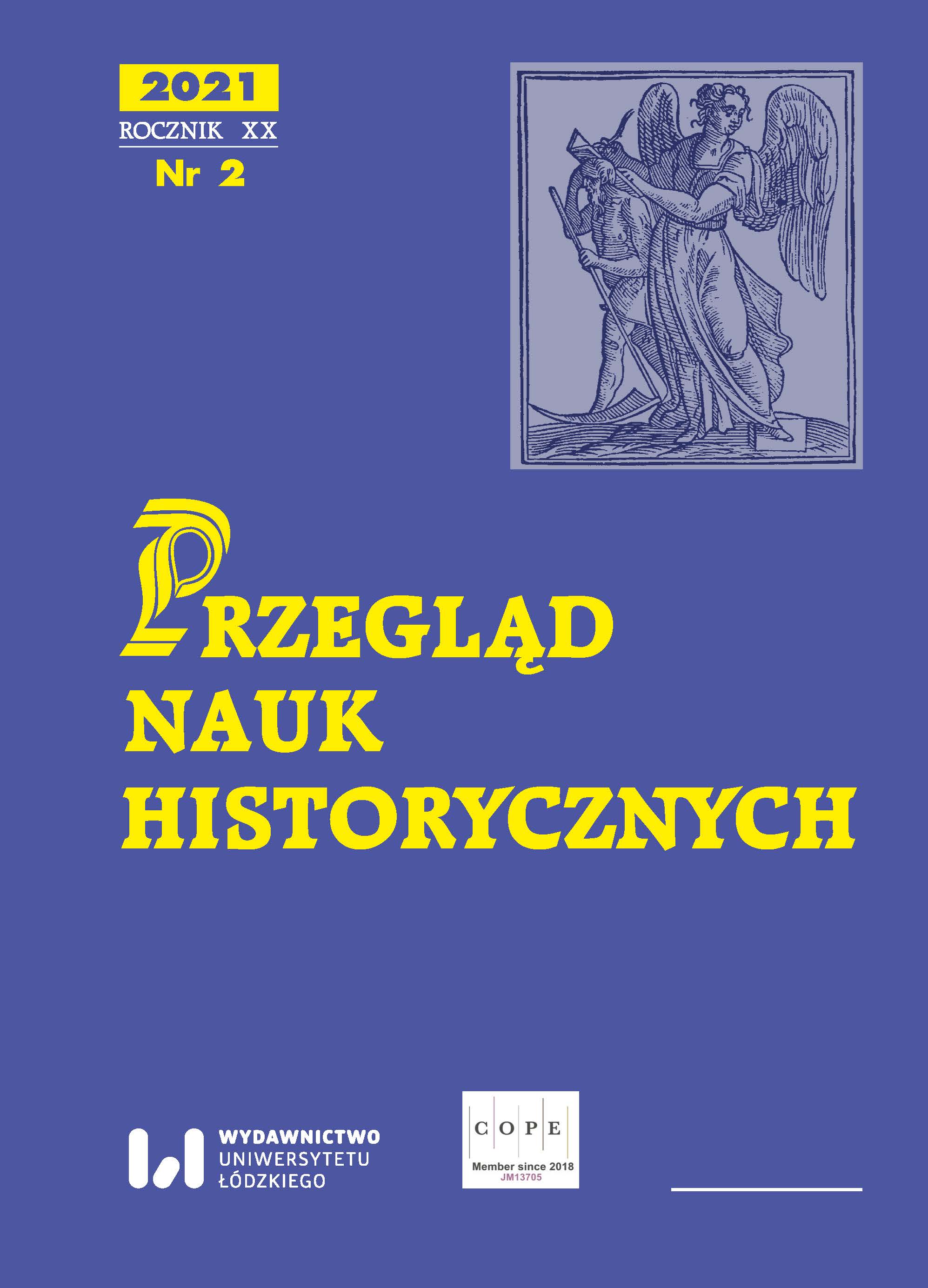Dracula – "non omnis moriar". Facts and myths from the life of Vlad III the Impaler
DOI:
https://doi.org/10.18778/1644-857X.20.02.01Keywords:
Dracula, Vlad III the Impaler, Wallachia, Bram StokerAbstract
Almost everyone has heard of the cruel Dracula, the vampire coming out of the grave and feeding on the blood of the living to live forever. But who was the prototype of the character who has permanently settled in the contemporary popular culture? In order to answer this and other questions, the presented article will describe the most important facts from the life of the Wallachian voivode, Vlad III the Impaler. Then, the most famous legends about Dracula will be presented, as they still influence the ever-growing myth of the Transylvanian vampire aristocrat, born in the nineteenth century on the pages of the novel by Irish writer Bram Stoker.
Downloads
References
Anderson J., Williams A., Head V., Rzezie, masakry i zbrodnie wojenne od starożytności do współczesności, transl. L. Hess, Warszawa 2009.
Google Scholar
Andreescu S., Vlad Ţepeş (Dracula). Intre legendă şi adevăr istoric, Bucharest 1998.
Google Scholar
Baranowski B., W kręgu upiorów i wilkołaków, Łódź 1981.
Google Scholar
Bartosiewicz A., Elisabeth Báthory – a true story, “Przegląd Nauk Historycznych” 2018, vol. XVII, No. 3, pp. 103–122.
Google Scholar
DOI: https://doi.org/10.18778/1644-857X.17.03.04
Cawthorne N., 100 tyranów, despotów i dyktatorów, transl. A. Wiśniewska, Warszawa 2007.
Google Scholar
Cazacu M., Drakula, 2nd ed., transl. B. Biały, Warszawa 2021.
Google Scholar
Czamańska I., Drakula, wampir, tyran czy bohater?, Warszawa 2013.
Google Scholar
Demel J., Historia Rumunii, Warszawa 1970.
Google Scholar
Felczak W., Historia Węgier, Wrocław–Warszawa–Kraków 1966.
Google Scholar
Florescu R., McNally R., Dracula: A Biography of Vlad the Impaler, New York 1973.
Google Scholar
Gemra A., Od gotycyzmu do horroru: wilkołak, wampir i monstrum Frankensteina w wybranych utworach, Wrocław 2008.
Google Scholar
Gerard E., Transylvanian Superstitions, “The Nineteenth Century”1885, vol. XVIII, pp. 128–144.
Google Scholar
Grabias M., Dracula – nowe perspektywy badawcze (recenzja), “Perspektywy Kultury” 2019, No. 25, pp. 193–198.
Google Scholar
DOI: https://doi.org/10.35765/pk.2019.2502.14
Humphreys C. C., Wład Palownik: prawdziwa historia Drakuli, transl. U. Gardner, Warszawa 2012.
Google Scholar
Hupchick D., Cox H., The Palgrave Concise Historical Atlas of the Balkans, New York 2001.
Google Scholar
DOI: https://doi.org/10.1007/978-1-137-04817-2
Johnson P., Count Dracula and the Folkloric Vampire: Thirteen Comparisons, “Journal of Dracula Studies” 2001, vol. III, issue 1, pp. 1–12.
Google Scholar
Langbein W.-J., Największe tajemnice świata. Niezwykłe wydarzenia ostatnich XXV wieków, transl. E. Jurczyk, Katowice 1994.
Google Scholar
Marcu A., Riflessi di storia rumena in opere italiane dei secoli XVI e XV, “Ephemeris Dacoromana” 1923, vol. I, pp. 371–375.
Google Scholar
McNally R. T., Florescu R., In Search of Dracula: A True History of Dracula and Vampire Legend, Greenwich 1972.
Google Scholar
Melton J. G., Hornick A., The Vampire in Folklore, History, Literature, Film and Television. A Comprehensive Bibliography, Jefferson, NC 2015.
Google Scholar
Miller E., Filing for Divorce Count Dracula vs Vlad Tepes, [in:] Dracula: The Shade and the Shadow, a critical anthology ed. by E. Miller, Westcliff-on-Sea 1998, pp. 1–7.
Google Scholar
Miller E., The Question of Immortality: Vampires, Count Dracula, and Vlad the Impaler, “Journal of Dracula Studies” 2002, vol. IV, issue 1, pp. 1–7.
Google Scholar
Reychman J., Historia Turcji, Wrocław 1973.
Google Scholar
Rezachevici C., From the Order of the Dragon to Dracula, “Journal of Dracula Studies” 1999, vol. I, issue 1, pp. 1–6.
Google Scholar
Rezachevici C., Punishment with Vlad Tepes – Punishments in Europe Common and Differentiating Traits, “Journal of Dracula Studies” 2006, vol. VIII, issue 1, pp. 1–13.
Google Scholar
Robotycki C., Wampiry. Od wierzeń ludowych do filmowych fantomów, “Konteksty” 1992, No. 3–4, pp. 148–149.
Google Scholar
Sala B. G., W górach przeklętych. Wampiry Alp, Rudaw, Sudetów, Karpat i Bałkanów, Olszanica 2016.
Google Scholar
Stoicescu N., Vlad Tepes’ Relations with Transylvania and Hungary, [in:] Dracula. Essays on the Life and Times of Vlad the Impaler, ed. K. W. Treptow, New York 1991, pp. 81–101.
Google Scholar
Stoker B., Dracula, Hertfordshire 2000.
Google Scholar
Stoker B., Dracula’s Guest and Other Stories, Hertfordshire 2006.
Google Scholar
DOI: https://doi.org/10.5117/9781904633143
Strzelczyk J., Mity, podania i wierzenia dawnych Słowian, Poznań 1998.
Google Scholar
Teodorescu C., Szemkovics L. S., Radu R., From Vlad Ţepeş – Wallachian ruler – to Dracula. Conclusive documents regarding his name and “fame”, “Quaestus. Multidisciplinary Research Journal” 2018, No. 12, pp. 55–68.
Google Scholar
Torz M., Od wołoskiego hospodara po ikonę popkultury, “Archeologia Żywa” 2018, No. 4(70), pp. 68–74.
Google Scholar
Treptow K. W., Vlad III Dracula: the Life and Times of the Historical Dracula, Portland 2000.
Google Scholar
Vorsino M., The Dragon, the Raven and the Ring, “Journal of Dracula Studies” 2003, vol. V, issue 1, pp. 1–6.
Google Scholar
Zych P., Vargas W., Bestiariusz słowiański. Część pierwsza i druga, Olszanica 2018.
Google Scholar
Dan P., Psycho-biographical considerations about Vlad the Impaler also known as Dracula, https://www.academia.edu/10342218/Psycho-biographical_considerations_about_Vlad_the_Impaler_also_known_as_Dracula (accessed: 19 VII 2021).
Google Scholar
Dracula – historia prawdziwa, https://historiamniejznanaizapomniana.wordpress.com/2015/08/29/dracula-historia-prawdziwa/ (accessed: 25 VI 2021).
Google Scholar
Gonerski K., Vlad Tepes: prawdziwa historia Księcia Draculi, http://www.horror.com.pl/publicystyka/art.php?id=62 (accessed: 1 VII 2021).
Google Scholar
DOI: https://doi.org/10.12795/CP.2020.i29.05
Hrabia Dracula – nieśmiertelna legenda, https://lo.tarnobrzeg.pl/lesser/artykuly/hrabia-dracula-niesmiertelna-legenda (accessed: 13 VI 2021).
Google Scholar
Książę Dracula wampirem? Historia prawdziwa, https://minds.pl/artykul/ksiaze-dracula-wampirem-historia-prawdziwa (accessed: 19 VII 2020).
Google Scholar
Michalewska A., Vlad Palownik. Prawdziwy Drakula, https://www.granice.pl/publicystyka/wlad-palownik-vlad-drakula-dracula-historia-prawdziwa/1134/1 (accessed: 15 VII 2021).
Google Scholar
Rozwadowski K., Wład III Palownik – Dracula, https://historia.org.pl/2009/10/05/wlad-iii-palownik-dracula/ (accessed: 1 VII 2021).
Google Scholar
Sanecki T., Dracula wampirem? Kim naprawdę był Vlad Tepes?, http://mojhistorycznyblog.pl/dracula-wampirem-kim-naprawde-byl-vlad-tepes (accessed: 5 VII 2021).
Google Scholar
Smith C., Vlad Ţepeş, his military campaign against the Ottoman Empire in 1462, and the forging of a Romanian national identity, https://www.academia.edu/25642701/Vlad_%C5%A2epe%C5%9F_his_military_campaign_against_the_Ottoman_Empire_in_1462_and_the_forging_of_a_Romanian_national_identity (accessed: 20 VII 2021).
Google Scholar
Vlad Tepes: Tyrant or Misunderstood?, https://owlcation.com/humanities/Vlad-Tepes-Tyrant-or-Misunderstood (accessed: 22 VI 2021).
Google Scholar
Downloads
Published
How to Cite
Issue
Section
License

This work is licensed under a Creative Commons Attribution-NonCommercial-NoDerivatives 4.0 International License.













